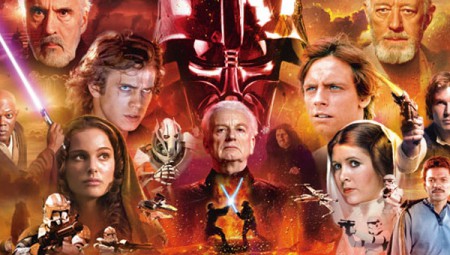On December 13, 2013, Beyonce did something so incredible, so insane and so unthinkable that it changed pop culture forever: she released an album. OK, so just the mere fact that she released music isn’t all that impressive, but the way she did it is. Without any prior promotion or announcement, when the clock struck midnight, the album appeared for purchase on iTunes.
Word quickly spread on Twitter and other social media while news outlets scrambled to find out just how she pulled it off. Beyonce’s self-titled album went on to become the fastest selling album in the history of iTunes, and had sold a million units less than a week later. Clearly the album and its marketing (or non-marketing) ploy were a hit.
Now, imagine you wake up on some Tuesday or Wednesday in 2015. You check your e-mail and then your Twitter, which has filled with nothing but tweets about Star Wars Episode VII. You slow your scrolling enough to read that the film is now playing in theaters. WHAT?! Looks like your plans just changed. You throw on a fresh set of clothes, tell the boss you’re taking a sick day, and race to your nearest cinema.
Yes, I am proposing that Disney “Beyonce” the release of the next Star Wars film.
This notion radically departs from the way films have been marketed for years now. When a studio has a potential blockbuster on its hands, the first step is to release a “teaser” poster and trailer. The poster usually just has some sort of logo or icon, and the trailer might only include a couple glimpses of actual footage (hence “teaser”). After that, a release date is announced and it becomes the marketing department’s job to marry that date with the film their advertising in your mind. This is reinforced through further posters, billboards, trailers and TV spots. That is why, on top of the money they’re already spent to make the film, a studio might spend $20-$50 million to market a film.
Most films make a third of their total box office take on their opening weekend, so it’s understandable that the studio would push the date they’ve elected to release the film so hard. In addition to that, the date they select has traditionally had something to say about the film. For example, January and September are where studios release titles they’re not very confident in, the end of the year is for family films and Oscar fare, and then there’s the blockbuster summer months. While these stereotypes still ring true in most cases, more and more films are bucking this trend. Alice in Wonderland opened to $116 million in March of 2010 (two years later, The Hunger Games bested Alice’s March record by making $152 million), Fast Five opened to $86 million in April of 2011, and The Lego Movie recently opened to $70 million in the thought-to-be-dead-zone of February this year. While it may seem that a film like Star Wars would have to release in either the summer or around the winter holidays, these examples show that the right film can work anywhere on the schedule.
It is my firm belief that if Star Wars Episode VII was released on, say, a Tuesday in September, it would still make $200 million before the weekend was over. On top of that sweet money, Disney would have saved a ton of money in marketing by letting the hype and word of mouth drive their sales. Advertising a new Star Wars picture is like advertising Coca-Cola — there’s really no need to, but they do it anyway.
Now that I have you convinced that Disney should be brave and release Episode VII in secret, you’re asking just how they could pull it off. To this I say if anyone can do it, it would be J.J. Abrams. This is a man who is famous for the level of secrecy his projects our shrouded in. Heck, even his Bad Robot production offices (incidentally located near Cloverfield Boulevard) sport a fake name on their exterior to fool fanboys.
While I’m no expert, here is a basic version of my plan:
- Release the normal posters for Star Wars, but, instead of committing to a date, just have the posters read “Coming Soon”.
- Decide on a real release date. Disney currently has the film slated for December 18, 2015, which gives them the whole year to choose from without raising suspicion. The biggest question would be whether they want to release in a wide open month like September or October, or spoil some other studios careful picked summer tentpole release by surprising the world a few days prior. While the film was already pushed from summer to winter due was time concerns, the beauty of the secret release is that as soon as a cut is locked, it can go out as fast as they can transfer the film to hard drives and send it out.
- Speaking of hard drives, most theaters in America now utilize digital projection and receive the films via hard drives. This might seem like they’re basically begging pirates to steal the films, but the data on the drives won’t play without a digital “key” that the studio sends the theatre separately. Each “key” is set with a time that it unlocks. Thus, my proposal is that they send the hard drives to theaters under a fake name and allow the keys to unlock only a few hours before the theaters first show.
- This would mean that the exhibitor bookers would need a heads up so that the theaters could make showtimes for the film. The film bookers at movie theaters are not low-level employees and usually work at a chain’s corporate office. On top of that, they each have a rapport with executives from the various studios. If Disney wanted to give the illusion that another film was being released on the date chosen for their Star Wars launch, they could easily have these bookers sign non-disclosure agreements threatening that they will never play another Disney film again if they leak anything.
- The bookers go along with the ruse, informing their theaters that they will be opening some weird indie film midweek that will only unlock at 6 a.m. the morning of release.
- As the east coast theaters start to open their doors, Twitter explodes, the media is thrown into a frenzy, and every God-fearing American makes their way to the closest movie house.
In a culture of spoilers and leaks, no one would have believed that Beyonce could have pulled off a secret album release, but she did. People purchased the album not just because they were fans of her music but also because they wanted to be part of the conversation and feel a part of this cultural phenomenon (do-doo-de-do-do).
The same would be true for Episode VII if they decided to take a risk and make history with this idea. In fact, it’s the type of idea that honors the legacy of a cultural cornerstone such as Star Wars. As blindsided as fans were by the announcement of Episode VII, this would absolutely blow them away. I can’t think of a better way to give them the sequel they’ve waited over 30 years for.



